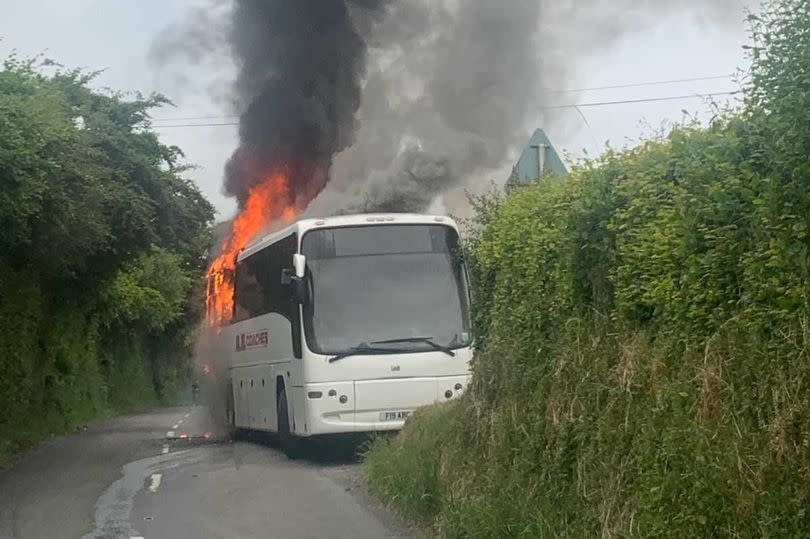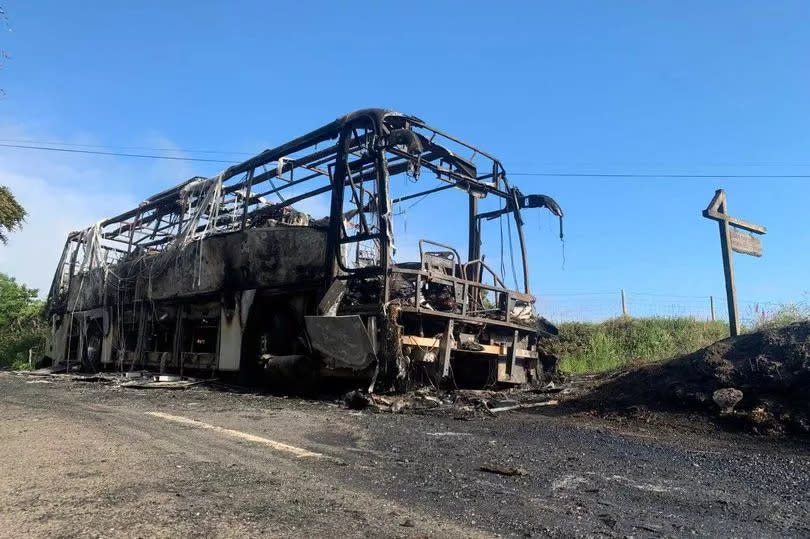Devon school bus fire sparks wider safety concerns

A Devon school bus that became a burnt-out shell after bursting into flames while transporting children back home this week has prompted wider safety concerns about the frequency of bus and coach fires. On Monday, June 24, a 53-seater vehicle taking children home suddenly caught fire and had to be ditched into a hedge and evacuated on the A39 Shamble Way, in Lynton.
The children and three adults on board were not reported to have been injured. The cause of the fire is thought to be 'accidental' according to Devon and Somerset Fire and Rescue Service. The incident has prompted Devon and Cornwall RMT regional union organiser Barry West to raise concerns about the 'significant' number of bus fires over the past seven years in the UK and share fears that it could take a catastrophic event such as Grenfell before safety standards are improved.
A Freedom of Information (FOI) request recently submitted by Mr West to the Driver and Vehicle Standards Agency (DVSA) has confirmed there have been 218 bus and coach fires in the past two years in the UK. Of those, none were deemed catastrophic.
Read next:
It was unable to confirm how many individuals suffered any injuries as it does not collect that data. The incidents were said to have involved 117 bus and coach operators.
It added its data was recorded data by regions, not counties, with the highest number of incidents - 38- being in the south east and and metropolitan. In the western area, there were 26 bus and coach fires in the past two years.
The FOI also confirmed 22 fires were the result of arson, 39 had electrical failures and there was no confirmed cause for 24 incidents. Two were caused by braking systems and 106 of the vehicles were diesel buses.
Earlier this year, a single-decker bus was completely destroyed by fire on the A35 near Dalwood at around 8.30am on February 13. The cause of the fire was said to be unknown at the time. On Tuesday, June 25, firefighters tackled a blaze on a bus in Quendon in Essex.
It was thought there were six people on the single-decker at the time of the incident. There were no reports of any injuries.
Mr West is now calling upon the DVSA to launch an investigation into the number of bus and coach fires.

He said: "There are approximately three catastrophic incidents most months in the UK with buses or coaches. I’m a safety campaigner and have been raising concerns about the significant number of bus fires for over seven years
"Bus companies, the government and the enforcement agencies appear to be ignoring the plea to recognise and to do anything to stop it or reduce the likelihood. It is a major concern as it puts the public at serious risk of injury or death.
"There has been and is a significant risk that there will be a catastrophic bus fire waiting to happen here in the UK. I believe that it will take a catastrophic event such as Grenfell where more than 70 innocent people needlessly died. We are sleepwalking into another such disaster and it is foreseeable and avoidable.
"The hazards are many, including fire, inhalation of toxic smoke, loss of control of vehicle, diesel or oil on the highway, and accidents while trying to evacuate or stood at the roadside. There are additional risks that the smoke could obscure visibility for other road users and cause loss of life or life-changing injuries.
"This happened when seven people died and 51 were injured during a series of collisions between 34 vehicles on the M5 northbound carriageway near Taunton on the evening of November 4, 2011. There are additional risks as emergency vehicles and staff make their way to the scene and have to control not just the fire, the spillage and the people - often the most vulnerable, elderly, infirm or children.
"This trend of bus fires needs to be thoroughly investigated and action taken to tackle the causes of bus fires and the rapid spread that ensues throughout the passenger section of the bus or coach. Fire regulations and the standards for construction and interior fittings need to be reviewed and reformed so that the materials used are significantly safer and designs that stop the spread of fire and of the toxic smoke.
"Investigations by an independent body such as the DVSA should be undertaken as there are serious concerns around the robustness, transparency and integrity of internal investigations that are often inadequate, where vital evidence is either damaged, disturbed or missed."
In July 2023, DVSA published the findings of its investigation into bus fires reported to it from 2020 to 2022. It said a “concerning” number of operators were claiming fires were due to “unknown” causes, with some submitting legally binding reports with “little” or “poor” information about incidents.
It added By law, operators must report a vehicle catching fire. However, it found that a number of reports about bus fires are submitted to the DVSA a long time after the incidents have taken place, sometimes with little or poor information and no record of any investigation into the root cause of the fire.
DVSA has been approached for a comment.

 Yahoo News
Yahoo News 
